Alumni Spotlight: Microsoft CEO Satya Nadella – University of Chicago Booth School of Business
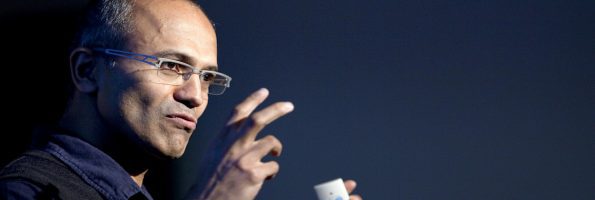
Once a ferocious beast in the kingdom of tech with massive product launches and Antitrust sagas, it could be argued that Microsoft has spent the first two decades of the 21st century in search of solid ground. The Steve Balmer era, which focused on “devices and services,” brought us the Xbox, the Surface, and the acquisitions of Skype and Linkedin. Wired posits that the fall of Microsoft “stems from its attempts to lock users into its products by refusing to work with competitors,” coupled with a series of “me-too hardware products,” like the Zune and the Kin. There’s also Bing and MSN, which are practically non-entities compared to their competition.
In the last three years, CEO Satya Nadella has been a relevatory savior for the company, spearheading a massive pivot away away from hardware and toward cloud computing and AI. So far, so good. Company shares reached record highs since 1999 and its cloud is valued at a $14 billion annual run rate, which places Microsoft neck and neck with Amazon Web Services, if you include Microsoft Office 365. That said, Nadella remains unphased by the numbers, as he tells the Economist, “When you have a core that’s growing at more than 20 percent, that is when the rot really sets in.”
Let’s take a deeper dive to find out more about Nadella’s past, present, and future.
Learning at Chicago Booth
Nadella’s tenure at Microsoft is inextricably linked with his University of Chicago Booth School of Business education. In fact he started both at the exact same time, in 1992. Instead of opting out of one for the other, he enrolled in Booth’s Weekend MBA program and flew from Seattle to Chicago every weekend for two-and-a-half years.
Nadella believes his Booth MBA was instrumental in giving him the “knowledge and confidence to tackle complex questions at the intersection of business and technology,” according to a UChicago profile. Nadella cites Steven Kaplan’s entrepreneurial finance class as particularly influential on his ability to “evaluate new business opportunities at Microsoft.” On Nadella, Kaplan spoke highly: “He can take a situation and analyze and articulate the issues involved. He can both write well and understand the case quantitatively.”
Wired traces Nadella’s “clarity of vision and empathetic listening style” to his firstborn son Zain’s cerebral palsy, which helped Nadella “see beyond himself and compelled him to force-rank his daily priorities so that he could meet his son’s needs and still perform his job—the same skill so necessary to effective management.” He tells Wired:
“I think back to how I thought about work before and after, and this notion of the words you say and what they can do to the other person. How can you really change the energy around you? It’s a thing that started building in me, and I started exercising it in my day job. It made a lot of difference to how I felt when I went back home. So much of it is mental attitude.”
Early Days at Microsoft
In 2015, Nadella told UChicago Booth Magazine, “Having grown up in the company, what is it 23 years or so, I always come back to the very first thing Microsoft did, the BASIC interpreter. It was this notion of empowering others to do great things.”
Nadella progressed quickly through company ranks. His first major notch on his belt was Windows NT but played significant technical roles in Bing, MSN, and Microsoft’s advertising systems. UChicago Booth Magazine pinpoints Nadella’s real contribution to the company during his tenure of Executive VP of cloud and enterprise businesses.
“At Microsoft, Nadella is navigating a rapidly shifting technology landscape, in which customers have been moving away from traditional desktop computers, toward nimbler mobile platforms such as tablets and smartphones.” Nadella says, “The only way you’re going to have that mobility of the human experience—not the device—is by having cloud orchestrate the movement.”
CEO
When the Nadella era began, he publicly invoked Nietzsche when he said Microsoft must have “courage in the face of reality,” according to Wired. His approach to steering Microsoft is nothing if not rooted in reality. Wired compared his Microsoft strategy to those of “the Silicon Valley startups that have eclipsed it” in which the change is cultural, not just organizational. The Economist writes that Microsoft is much more of a “full stack” firm, in which it “not only writes all kinds of software, but builds its own data centers and designs its own hardware.”
Nadella tells UChicago Booth Magazine, “My vision is to take that productivity and empowerment of individuals and organizations and express it in this new world, which is mobile-first, cloud-first.”
Nadella jettisoned the company’s R&D process in favor of a more transparent, open-ended model, which is perhaps in response to such New Coke-style abominations as the Microsoft Courier. He encourages execs to work with people outside their divisions, whose lines of demarcation have become increasingly ambiguous.
He’s pushing engineers and researchers from disparate parts of Microsoft to work more closely together—even wrangling Bill Gates back into the saddle as a part-time technical adviser to motivate his team. “When I say, ‘Hey, I want you to go run this by Bill,’ I know they’re going to do their best job prepping for it,” he tells Wired. Nadella described Microsoft’s Skype Translator, which offers real-time translation of multilingual chats, as the apotheosis of his cooperative company-wide strategy.
The Future
Nadella tells UChicago Booth that his overarching vision for Microsoft is to adapt to the dialogue between culture and technology but to push for a more productive, harmonious conversation. In March, Nadella shared his vision for a new “platform-neutral” Microsoft with the announcement that the company would soon launch Word, Excel, and PowerPoint editions for the iPad.
“Technology has always led us to have better lives [but] you can measure whether you’re doing anything useful. Do you feel a little stretched? If not, there’s something wrong.”
Finding the Best Laptop for Business School

Brand. Affordability. Technical specifications.
In no certain order, these principle factors are the three pillars to consider when purchasing a laptop. For prospective business school students, despite having very different priorities than your average consumer, these three factors tend to weigh above everything else. However, before starting any MBA program, there are a few more things that they may need to consider.
Finding The Right Laptop for Business School
The UCLA Anderson School of Management, one of the world’s most familiar business school institutions, gives incoming students a comprehensive guide of what kind of laptop they’ll need before starting the MBA program.
Like many business schools, most of the software required by the UCLA Anderson MBA program run on the Windows operating system. As we previously mentioned, this is primarily because business school students are expecting to utilize familiar programs like Microsoft Excel. Windows is the standard operating system for most computers, however, it can be installed on Macs for optimal use.
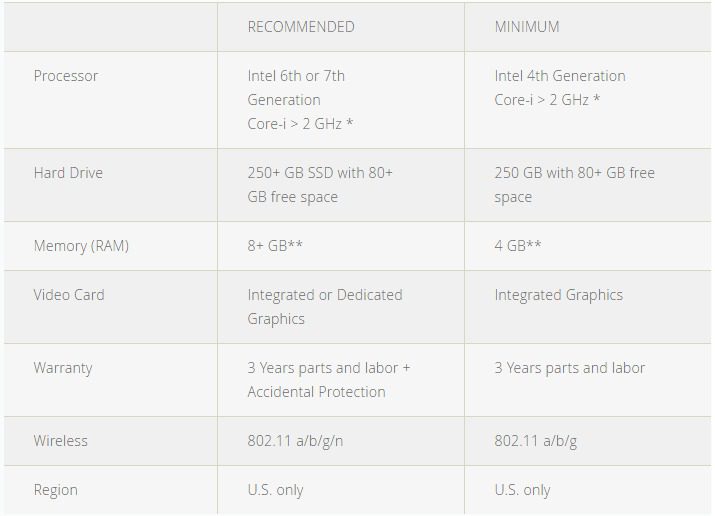
Technical specifications recommended for UCLA Anderson MBA students.
Many of the specifications UCLA Anderson details in their recommendations for students, such as the 4 GB of memory, come standard with most mid-level to premium-level laptops. For the unfamiliar, 6th and 7th generation processing units are also standard for any recently-purchased PC. The last 4th generation Intel processor was shipped in early 2015.
Using UCLA Anderson’s guideline as an informal rule of thumb, we’ve broken down what optimal devices you should be looking for if you’re enrolling in an MBA program, or need an immediate upgrade while you continue your studies.
Looking for Something Affordable
For those in the market for a more affordable machine or are concerned their recently purchased Chromebook isn’t up to par, there are more options than ever in the affordable laptop market. The Acer Aspire E 15, the world’s best-selling laptop, is among the most affordable bets available. Lauded by Laptop Mag, which called it the best sub-$500 laptop on the market, the Acer Aspire E 15 starts at a surprising $350, or, $429 coupled with Windows Office. The standard $350 model comes with an Intel i-3 7th generation processor and 4 GB of standard memory with numerous upgrade options available.
For a slightly larger investment, however, MBA students may be hard-pressed to look at the Lenovo ThinkPad 13.
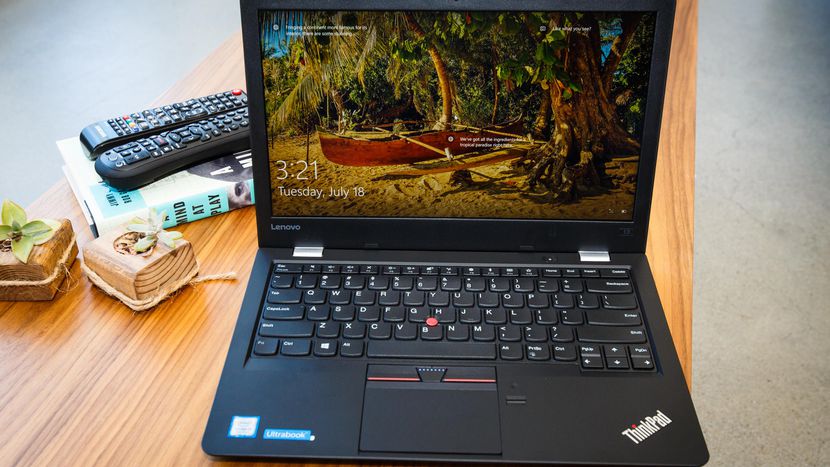
Lenovo ThinkPad 13/Photo via CNet
The ultra-durable (military-tested, in fact) ThinkPad has become a staple model for the business community. Starting at just under $500, the ThinkPad 13 has numerous available upgrades with an astounding 12-hour battery life. For those enrolled in or joining an MBA program, the model comes with a standard 4 GB of memory, but requires an upgrade to an Intel 7th generation processor.
The Optimal Mid-Tier Option
For those looking to invest a bit more in your purchase, Dell’s mid-tier XPS and Inspiron models might be the best machine upgrades without going the bank-breaking route.
The award-winning XPS models have become the crown jewel of the laptop market for the past few years, rewarded by outlets like Laptop Mag, PC Magazine, and TechRadar as one of the best computers on the planet. The XPS 13, starting at $799, comes packed with the latest 7th generation Kaby Lake Intel processor, providing a visual performance that cannot be matched by even the best affordable options. With some welcoming but not totally necessary upgrades, the not-yet-released 2018 model will sport a slightly reduced price even with the fully-packed new specs, including the 8th generation Intel i-7 processor, 8 GB of memory and 256 GB of SSD storage. Still, for MBA students, the standard XPS 13 or slightly larger-sized XPS 15 are more than enough to start.
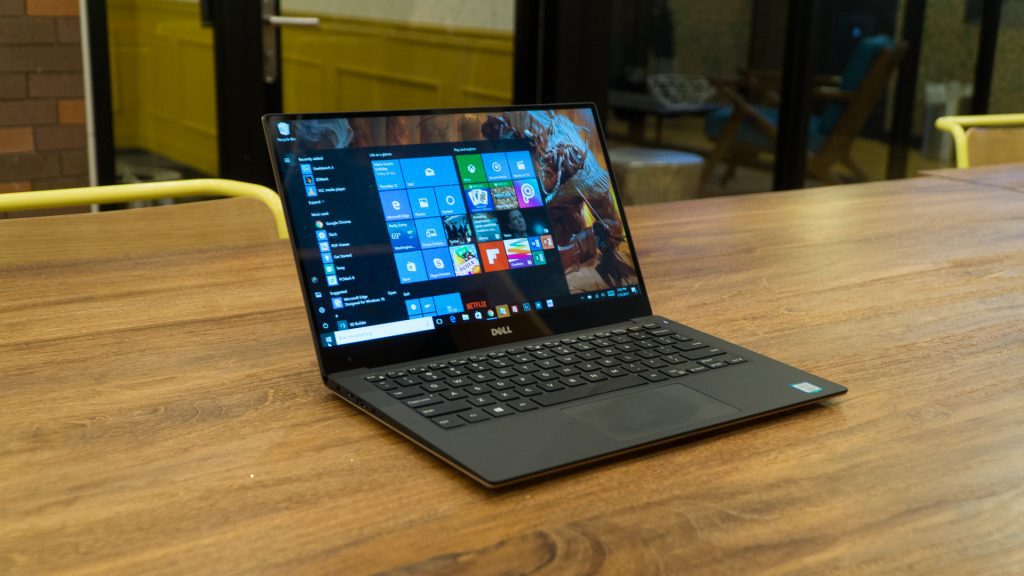
Dell XPS13/Photo via TechRadar.
High Rollers
No one will argue going for the affordable route, but, let’s be honest for a moment. If you’re seriously considering enrollment in an MBA program, or are already enrolled in business school, dishing out a couple hundred more bucks for a top-tier laptop model doesn’t even come close to tuition rates. Plus, if you’re looking at the new laptop as an investment, then providing some more resources might be the best choice you can make.
Beyond the $1,000 benchmark, the aforementioned Mac becomes obvious. The visually-stunning new MacBook Pro may be the most hip offering out there, even with the $1,499 starting price tag (which jumps to $1,799 with the giddy TouchBar). The 13″ MacBook Pro boasts some of the sleekest industrial design of any available model, although without any available USB ports. To make the machine slimmer than the competition, Apple, to a sea of complaints and curious convictions, eliminated much of the standard ports included in most laptops in favor of adaptable Thunderbolt C ports. For the business student, the model may not seem to be precisely necessary. But for entrepreneurs looking to expand a brand with world-class designs and presentation, there may be no better accompanying device.
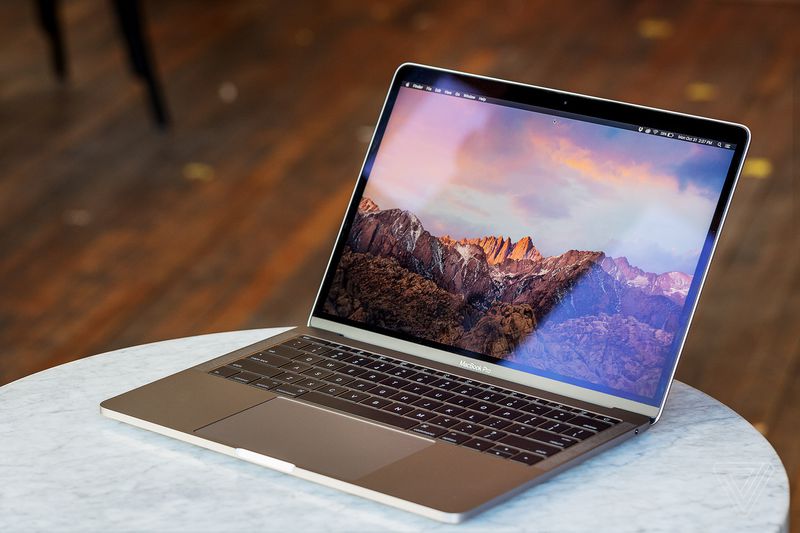
The new MacBook Pro/Photo via Verge.
Still, foregoing a machine that comes complete with Windows OS isn’t recommended for MBA students. For those that prioritize sleek exterior design and slim portability, then why not go right to the source? Microsoft’s endearing Surface Pro is among the world’s most beloved models, called the “Best Laptop Right Now” earlier this year by Verge.
“Microsoft’s new Surface Laptop is the best laptop for most people because it blends power, portability, and battery life better than any other computer. It has a great keyboard and trackpad; a beautiful, high-resolution touchscreen; and comes in four different colors. It uses Intel’s latest processors and can be specced out with up to 16 GB of RAM and 1 TB of storage.”
Like the aforementioned Dell XPS 13, the Surface starts at $799, but fully modifying the machine is probably the way to go. Unlike the other models mentioned, however, Surface Pro owners have the option to immediately upgrade to Windows 10 Pro for free. This offers easily usable features welcome to any business school climate, along with the standard Intel 7th generation processing unit.
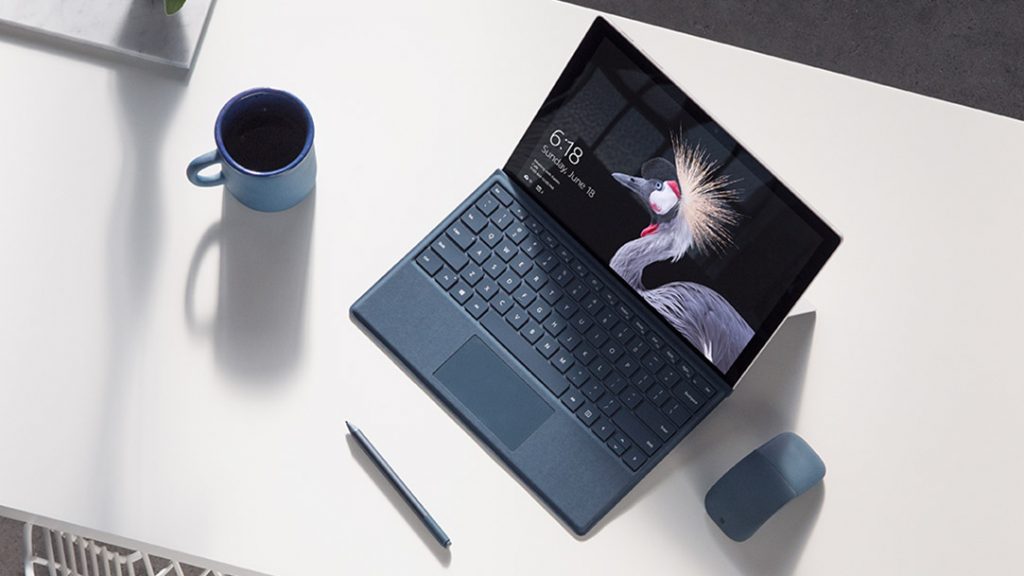
Microsoft Surface Pro/Photo via Microsoft
When Should You Buy a New Laptop?
According to Cnet, the right time to buy a laptop might not be so obvious, like Black Friday. Rick Broida writes, “Sure, you’ll see some low-end laptops priced to move, but high-end models—gaming laptops, ultraportables and the like—don’t usually see big Black Friday price cuts. Rather, history suggests that these machines sell for less in the summertime, during back-to-school sales.
For those looking to invest in a higher-end model, do not expect sales any time soon—if at all. Optimally, whichever laptop you have must be ready before the start of the MBA program. Some schools, like the aforementioned UCLA Anderson School of Management, require a laptop review months before the program begins, so a purchase is better made sooner than later.
D’Amore-McKim Marketing Study Says Let Customers Do The Talking on Social Media
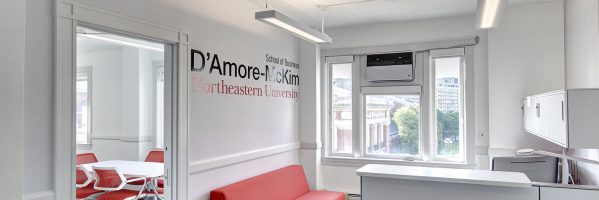
According to Northeastern professor Koen Pauwels’ recent Journal of Marketing paper, there are “three consumer mindset metrics” within social media that affect stock performance and shareholder value. D’Amore-McKim recently explored his research.
The 5 Best Dallas Executive MBA Programs

In the world of business, the Executive MBA degree is akin to an Iron Man decathlon in which one simultaneously attempts work, life, and school with equal gusto.
Designed to reskill and get mid-career professionals up to speed on the latest management trends, the value of an EMBA as a useful negotiation tool is undisputed—especially if you can get an employer to fit the bill. If not, it’ll cost you but the investment is one that will certainly go a long way to paving a future leadership position way up the corporate ladder.
And when it comes to corporate ladders, the greater Dallas metro area has got an embarrassment of riches. The region is HQ to Exxon Mobil, AT&T, American Airlines, Southwest, Texas Instruments, JC Penney, and Gamestop, among many others on the 2017 Fortune 500. You could also do a lot worse with the area’s cultural offerings, especially if you like football, art, and authentic Tex-Mex.
Let’s take a closer look at five best Dallas Executive MBA programs:
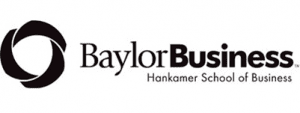
Baylor’s Hankamer School of Business
The Baylor Hankamer School of Business 48-credit, 21-month, $91,000 EMBA is designed for mid-level executives. The program emphasizes leadership skills, decision-making, human resource management, global strategic management, and contemporary business issues within a cohort lock-step structure. The 50-credit, $94,000 EMBA Healthcare curriculum does the same but specifically tailored to the healthcare sector. EMBA students arrive from a variety of companies, including Apple, AT&T, Xerox, Wells Fargo, Microsoft, Coca-Cola, Wal-Mart, and American Airlines. The EMBA does not require GMAT or GRE scores but applicants must have at least five years of work experience.

Southern Methodist’s Cox School of Business
The SMU Cox 21-month, $120,150 part-time EMBA prepares experienced business leaders to take their career to the next level by helping them move into higher executive level positions or to expand their company’s reach. The EMBA emphasizes general management practices, strategy, finance within real-world applications. Applicants are expected to have at least eight years of work experience but GMAT/GRE scores are not required.
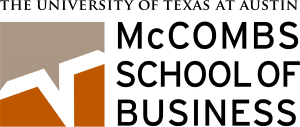
UT-Austin’s McCombs School of Business
The curriculum for McCombs School of Business 2-year, 42-credit, $116,800 EMBA is based on a cohort system in which groups of five students “encourage teamwork and development of leadership skills” among one another and each student is paired with a mentor from the previous year’s class. The EMBA covers effective communication, risk and change management and business ethics. Of the 68 students in the EMBA class of 2018, the average age is 37 and the average work experience is 14 years.
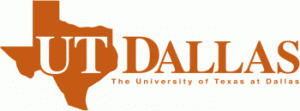
UT-Dallas’ Naveen Jindal School of Management
The UT Dallas Naveen Jindal School of Management 21-month, 53-credit, 5-semester, $85,000 EMBA was developed to prepare “experienced professionals for careers in upper management.” The cohort structure centers on “the fundamentals of business, marketplace advancement, leadership, corporate assets strategy, and data use and interpretation.” The average UT Dallas EMBA student is 40 and with an average work experience of 16 years. Applicants must have a minimum of eight years “professional business experience with international and management experience,” although GMAT or GRE scores are not required.

UT-Arlington College of Business
The UT Arlington College of Business 15-month, 37-credit, $74,500 EMBA (and accompanying Asian Business Studies certificate) is ideal for helping mid-level and upper-level managers and executives “develop the skills needed to move their company into global markets or to increase the company’s presence in a global market.” The EMBA focuses on the “skills and knowledge needed to run multinational firms, manage data, and develop effective teams that will help firms expand into global markets, maintain customer value, and build long-term customer relationships.”
Its cohort structure allows students to gain “extensive experience working collaboratively as part of a team,” which extends to the two-week Chinese immersion trip in which students develop a project specific to the region.
The average UT Arlington EMBA student is 38 with an average of 16+ years of work experience. Executive MBA students generally pay for the program through employer sponsorship, although there are scholarship and financial aid opportunities available.
Full-Time MBA Battle: San Francisco vs. Seattle

Whether it’s 49ers vs the Seahawks or Apple vs Microsoft, it may seem like there are a lot of differences between San Francisco and Seattle. Putting these minor dissimilarities aside, however, and you’ll find common ground between two of the northwest’s biggest cities: Both metros are known as top locations for prospective MBAs looking to earn an advanced business degree full-time. Continue reading…
The Best Part-Time MBA Programs You Can Find in Seattle

For those who feel stuck in a middle management position, getting an MBA is a great way to get a leg-up on competition and put yourself in the running for higher-level opportunities. Unfortunately, a 9-to-5 job does not leave much time to devote to full-time learning.
However, the majority of MBA programs offer flexible, hybrid, or part-time options to accommodate all sorts of schedules. Below, we offer a rundown on the three best Seattle part-time MBA programs.
The Best Seattle Part-time MBA Programs
Seattle Pacific University School of Business, Government and Economics
At the Seattle Pacific University School of Business, Government and Economics, a full-time career does not have to deter motivated professionals from pursuing higher education. SPU’s part-time program consists of evening and weekend classes, and is designed to fit into a busy schedule. The university markets the program specifically to established professionals looking to integrate valuable MBA knowledge and skills into their current position.
The 45-credit program consists of ten advanced courses and five elective courses. Selecting an emphasis can help professionals tailor their education to their specific business needs. Students can choose any of the following emphases: Human Resource Management, Finance, Management, Cybersecurity, Data Analytics, Social and Sustainable Business, or Information Systems Management.
SPU’s part-time program might appeal to professionals who prioritize integrity and wish to make a positive contribution to their workplace and community. The university requires at least two ethics courses, and underscores the importance of morality in business.
Foster School of Business—University of Washington
The UW Foster School of Business has several options for aspiring MBAs who cannot commit to a standard full-time program. Foster offers an Evening MBA, a Hybrid MBA, and an Executive MBA to accommodate various lifestyles.
Forster’s Evening MBA takes three years to complete. Students in this program have an average of almost seven years of work experience, making this track a great option for more seasoned professionals looking to enhance their contributions at their jobs, or perhaps looking to make a late career change.
The Executive MBA (EMBA) at Foster may also be the right choice for those looking for a program that is compatible with full-time work and life obligations. Though not limited to executives, the EMBA is specifically designed for seasoned professionals seeking knowledge they can apply in their professional lives right away. The 21-month program provides the option to take classes weekly or monthly, to meet the needs of those who might have to commute.
If finding time to commit to on-campus courses seems difficult, Foster’s Hybrid MBA might be a good fit. The program involves quarterly in-person sessions, and the rest of the coursework takes place online.
Albers School of Business and Economics—Seattle University
Seattle University’s Albers School of Business and Economics offers students in the Professional MBA (PMBA) the chance to pursue their degree part-time. This program is ideal for students who want to tailor customize their education to fit their interests and career goals, as electives comprise two thirds of the 54 required credits. Students on the PMBA track must have a minimum of two years of work experience. Graduates of this program have gone on to high-level positions at companies like Nike and Microsoft.
